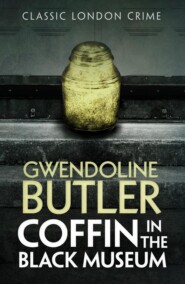По всем вопросам обращайтесь на: info@litportal.ru
(©) 2003-2024.
✖
Coffin on Murder Street
Настройки чтения
Размер шрифта
Высота строк
Поля
But what he had not expected was to see such a large, handsome and healthy child. Somehow a frail, delicate little creature would have been more suitable for Nell.
Nor had he expected to see Nell looking down at the boy with such evident love.
Sad, he thought. Very sad. Oh Gus, oh Nell, what a pair of star-crossed lovers you have been. It’s a tragedy. Shakespeare, Euripides, Racine. On that scale.
A new voice took over on the telephone. ‘What have you done to Gus? He’s in a terrible state.’ The girl Gus currently shared his flat with, a singer. Ellice knew all the gossip.
‘You ought to watch over that young man,’ he said seriously. ‘He’s dangerous.’
The voice went on at him again.
‘I know, dear,’ said Ellice, ‘I know you say Gus is a very private person.’ Whatever that meant, not a bright girl, this one, just lovely long legs and a way of picking up clichés. ‘But we don’t want any of this Here we go and Vengeance is mine says the Lord and I am his instrument, do we?’
Like John Coffin, he too smelt trouble. He was tired now, but he was glad he had looked in at Stella Pinero’s outfit that night, always nice to see Stella. Not a great talent but a real pro.
CHAPTER 3 (#ulink_37f33ed5-55f1-5abb-9cb0-d6cd60ba41bc)
Still on March 5
There was a special scent for trouble, Coffin thought. Somewhere between sour smoke and vinegar. The exact smell varied according to the quality of the trouble. The very worst of trouble took your breath away, it was so sharp, so acrid. He had smelt it once or twice in his life and hoped never to smell it again.
It wasn’t the sort of thing you mentioned, especially if you were a senior police officer, because other people might not smell it. Possibly did not. But everyone had something, he guessed, some little forerunner of trouble about. To some it might be a pain in their big toe. Or indigestion. Or even just a strong desire to quarrel with their wife. He had no wife himself. He had one once, but that was long since, and she lived now in another country and he bore her no grudge. Hell it had been at the time.
He walked home to his flat, Stella having eluded him, and considered what trouble Nell Casey could be bringing with her. Gus, certainly, was high on the list. In fact, he might be the trouble.
Certainly connected with it, he thought, as he put his key in the lock.
He did this with a certain pleasure. He liked his handsome oak front door, old as the church itself, with a great lock whose brass key weighed down his pocket. He liked his home, of which he was quietly proud, and of himself for owning it. He had paid his sister, who had converted the church, a pretty price for the place, but it was worth it. Up in his tower he felt at peace, and peace was not a thing that came easily in his life. In the course of his career, he had had many homes in different places, some decidedly scruffy. Now he lived in his church tower with a sweeping view of his bit of London.
He walked up the winding inner staircase, past his kitchen up to his sitting-room on the top. Above him he had the turret and a tiny roof garden where his cat sunned himself among the geraniums and daisies which were all the flowers that Coffin managed to grow. They were, he found, indestructible plants, which even he and the London climate could not destroy.
Tiddles, the cat who had chosen to live with him and who answered to no name or any according to mood, sidled up to him, suggesting a little snack would be acceptable.
Coffin liked to say he lived alone, but while he had Tiddles he was never alone. Tiddles, although a quiet animal, had a strong presence. He was not to be ignored, as witness the feeding bowl in the kitchen, the sleeping basket complete with plaid blanket by the window (he rarely inhabited this but a cat liked to have a bit of property), and the supply of his favourite food, minced beef, in the refrigerator.
‘Later, boy,’ Coffin said to Tiddles, throwing his coat on a chair. He had decorated this room with his few good bits of furniture, several large bookcases, and his treasured large oriental rug. Letty had ordered him to buy a Chinese rug because she said it matched the ceiling, but he had resisted her advice and bought a Bokhara. On the walls he had three biggish oil paintings which he had bought himself, backing his own taste. You had to be strong with his sister Letty or she bullied you. He loved her, though, and was delighted to have her in his life.
For so long, he had not known he had a sister, although he had suspected he had a sibling. Then this beautiful, clever, enigmatic sister, Laetitia Bingham, had identified herself. Life had then delivered a bonus in the form of brother William. He did not love William, but he was prepared to like him and he certainly respected him. He suspected that his half-brother was, as they say in Edinburgh, a ‘warm man’, and Coffin who had never made more than his salary had to respect a man who could make money. Willy might be warm but his money was never burnt. William was both canny and cautious and that inheritance must have come from his father’s side of the family, from his mother’s it was impossible. Only in his marriage did William show a streak of that lady, for his wife was flaxen, buxom and extravagant. It was William who had come across his mother’s diary in some old property left for safe keeping with the family that had brought him up, read what she had written with a mixture of shock and amazement at her racy ease, and Letty who had suggested the diary should be published. ‘Not exactly the memoirs of an Edwardian lady but the frank, honest account of a real woman’s life before, during and after the war. That is how we must sell it,’ she had said.
Frank, Coffin admitted; honest, he doubted. He thought Ma might be a bit of an old liar. It almost seemed as if she had written for publication. A mystery there. He would probe it, and one day might get to the bottom of it. Meanwhile, it gave him something to exercise his mind on in the wakeful stretches of the night. A recent recruit to the ranks of insomniacs, he had plenty of those.
He checked his answering machine: no messages. His telephone remained quiet. Such inactivity was unusual, since he had instituted the rule that he received notice, even if briefly, of all important activities involving his force, whatever the time of day or night. He never wanted to be caught off guard. He was well aware that the social tensions in his area between those who had and those who had not, between the new inhabitants who had paid a lot for their property and did not want it sullied by the proximity of the old inhabitants who had ways of their own, not to mention various racial undercurrents, made for an inflammable mixture. If there was going to be a riot, he wanted to be the first to know.
As he handed out some food for the cat and then prepared for bed, he found he was more worried by the quietness than by a stream of messages. He checked again all the machines that ought to have been speaking to him, but found nothing wrong with them. Just a very quiet night.
Tiddles, fed and let out through the window which gave on to a roof so that he could descend, tail waving, upon the town like a Restoration gallant, had gone about his business, and Coffin poured himself a drink.
He would have to come to some resolution of his relationship with Stella Pinero. That was why he wasn’t sleeping. He loved Stella, had loved her for years, but Stella engaged in her own career and living elsewhere was one thing, Stella always on the premises was quite another. They had tried it once, in the distant past when they were both a good deal younger, and it hadn’t worked.
I jolly nearly did her in, he reflected, that night she threw the saucepan at me and I threw it back. Stella had missed; he hadn’t. It had been the instinctive action of a good games player, but it had brought him up short. Violence towards Stella was not something he wanted to exhibit. He had helped her up, asked her to forgive him and moved out. Shortly after Stella had gone on a long tour of a Rattigan play with the first company, and he had gone on a course in Cambridge. They had not met for years.
Over, he had thought, all over. But it was never over between him and Stella, it was like a disease they had both caught, in which there were many remissions (in one of which he had married, and in another, Stella had done so) but no real cure.
She was part of his life forever, and living, moreover, only a stone’s throw away. Those facts had to be faced and dealt with.
I’ll do that tomorrow, he thought.
Tiddles leapt back in through the window, his fur smelling of the fresh air.
Coffin turned his mind to other things. Odd about the child. No, not odd at all. Everyone, all young achievers, had one these days, in or out of wedlock, they were fashionable. Even if you didn’t fancy one for its own sake, then it was the smart thing to do. But this kid was loved, you could see that.
Was it Gus’s? The age was about right, according to the chronology of the story as transmitted by Stella, who was actually accurate about things of this sort. She could be madly wrong and ill-informed about matters of national importance but about personal details she could be relied upon.
A night without a single crime, he thought, a peerless, uncorrupted night. What a treat. Nothing to think about.
He and Tiddles were just about to go to bed, they shared one, not from Coffin’s choice but because Tiddles offered none, he was always there, soundly asleep with his head on the pillow. The utmost freedom allowed to Coffin was to take the other pillow. He had Tiddles and Tiddles had him.
He was just choosing which book to read in bed when the telephone rang.
‘Sir?’ It was the duty officer at his headquarters. ‘Just to inform you that a coachload of tourists on a trip through the City has disappeared.’
‘How many?’
‘Twelve plus the driver.’
Thirteen people missing, then. A bumper crop, the peerless evening effortlessly racing ahead of itself and creating a record.
Still, no reason to believe they were dead or otherwise harmed. Just missing.
‘No accident reported?’
‘No, sir, not in our districts or outside.’
Of course not, that would have been the easy answer and he would not have been bothered in the small hours. It was now nearly one o’clock in the morning.
‘Any messages, demands for ransom, anything of that sort?’
‘No, sir. Silence.’
‘There may be something later.’
‘Not a very rich firm that runs the tours, sir. And the people they get on the tours aren’t in the millionaire class.’
‘They’ll turn up,’ Coffin said confidently. They’d have to, dead or alive, you couldn’t easily dispose of that many bodies.
‘Of course, sir.’
‘Let me have the details,’











